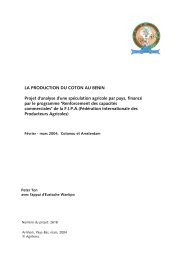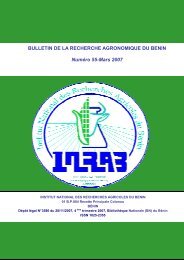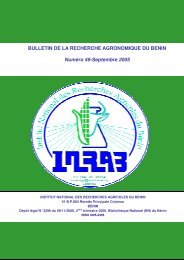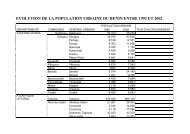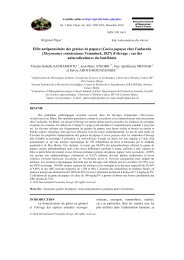Bulletin <strong>de</strong> la Recherche Agronomique du Bénin Numéro 69 – Juin 2011I<strong>de</strong>ntification d’activités agricoles adaptées aux ménages affectés par leVIH/SIDA au Sud-Bénin et analyse <strong>de</strong> leur prédisposition à adopterRésuméJ. U. I. AGBAHEY 10 , G. BIAOU 11 , B. J. GBAGUIDI 10 et O. N. COULIBALY 10Le VIH/SIDA est désormais reconnu comme un problème <strong>de</strong> développement en Afriquesubsaharienne. En milieu rural, les réponses à la pandémie nécessitent l’i<strong>de</strong>ntification d’activitésgénératrices <strong>de</strong> revenus adéquates p<strong>ou</strong>r les ménages affectés. Dans le but d’i<strong>de</strong>ntifier <strong>de</strong> tellesactivités, la présente étu<strong>de</strong> a été conduite auprès <strong>de</strong> 144 ménages agricoles échantillonnés <strong>de</strong> façonaléatoire dans les quatre zones agro-écologiques du Sud-Bénin. L’i<strong>de</strong>ntification <strong>de</strong> ces activités s’estfaite à travers la revue documentaire, les discussions <strong>de</strong> gr<strong>ou</strong>pe avec les ménages affectés et lesentretiens avec <strong>de</strong>s personnes-ress<strong>ou</strong>rce. Afin d’évaluer la prédisposition <strong>de</strong>s ménages affectés àadopter les activités i<strong>de</strong>ntifiées, <strong>de</strong>s entretiens individuels ont eu lieu avec les chefs <strong>de</strong>s ménageséchantillonnés. L’analyse <strong>de</strong>s déterminants <strong>de</strong> la prédisposition <strong>de</strong>s ménages à adopter ces activitésa été effectuée à l’ai<strong>de</strong> d’un modèle logit binomial. A l’issue <strong>de</strong> l’étu<strong>de</strong>, les activités i<strong>de</strong>ntifiées sontp<strong>ou</strong>r la zone agro-écologique V l’agroforesterie et la production animale, p<strong>ou</strong>r la zone VI, la productionanimale, et p<strong>ou</strong>r les zones VII et VIII, le maraîchage et la production animale. Les taux <strong>de</strong>prédisposition <strong>de</strong>s ménages affectés à adopter ces activités varient <strong>de</strong> 80% (zone VIII) à 95% (zoneVI). Les déterminants <strong>de</strong> la prédisposition à adopter sont : la taille du ménage, la durée moyenne <strong>de</strong>travail j<strong>ou</strong>rnalier <strong>de</strong>s membres du ménage et l’âge du chef <strong>de</strong> ménage. Les résultats <strong>de</strong> l’étu<strong>de</strong>mettent à la disposition <strong>de</strong>s services <strong>de</strong> vulgarisation et <strong>de</strong>s projets intervenant sur le VIH/SIDA enmilieu rural <strong>de</strong>s activités p<strong>ou</strong>vant être promues auprès <strong>de</strong>s ménages agricoles affectés.Mots clés : VIH/SIDA, systèmes <strong>de</strong> production, ménages agricoles, socioéconomie, Bénin.AbstractAlternative farming activities for HIV/AIDS affected farm h<strong>ou</strong>seholds inS<strong>ou</strong>thern-Benin and their willingness to adoptRecently, HIV/AIDS has been consi<strong>de</strong>red as a <strong>de</strong>velopment problem in Sub-Saharan Africa. The mainissue now is the i<strong>de</strong>ntification of suitable activities which c<strong>ou</strong>ld enable the affected h<strong>ou</strong>seholds tomaintain appropriate livelihoods. In or<strong>de</strong>r to i<strong>de</strong>ntify such activities, this study was conducted in thef<strong>ou</strong>r agro-ecological zones of S<strong>ou</strong>thern-Benin and involved 144 affected h<strong>ou</strong>seholds, sampledrandomly. The study consisted of three main instances: a literature review, gr<strong>ou</strong>p discussions with theaffected h<strong>ou</strong>seholds and discussions with key-informants. A logit regression was used to test theh<strong>ou</strong>seholds’ willingness to adopt the i<strong>de</strong>ntified activities. In Zone V, the activities i<strong>de</strong>ntified wereagroforestry and livestock production. In zone VI, the most promising activity was livestock production.Concerning zones VII and VIII, the activities suggested were horticulture and livestock production. Thewillingness to adopt test showed that 80% to 95% of the affected h<strong>ou</strong>seholds were willing to adopt thei<strong>de</strong>ntified activities, according to the agro-ecological zones. The <strong>de</strong>terminants of their willingness toadopt were: the size of the h<strong>ou</strong>sehold, the duration of the daily work of the h<strong>ou</strong>sehold’s members andthe age of the head of the h<strong>ou</strong>sehold. These results sh<strong>ou</strong>ld be taken into acc<strong>ou</strong>nt by extensionservices and organizations involved in the struggle against HIV/AIDS in rural areas in or<strong>de</strong>r to addresseffectively the needs of the HIV/AIDS affected h<strong>ou</strong>seholds.Key-words: HIV/AIDS, farming systems, farm h<strong>ou</strong>seholds, socioeconomics, Bénin.INTRODUCTIONLe nombre <strong>de</strong> Personnes Vivant avec le VIH (Virus d’Immunodéficience Humaine) dans le mon<strong>de</strong> necesse <strong>de</strong> s’accroître atteignant 33,4 millions en 2009 (UNAIDS, 2010). Ce nombre est 20% supérieurà l’effectif estimé <strong>de</strong>s PVVIH en 2000 et est le triple <strong>de</strong> ce même effectif en 1990 (UNAIDS, 2009). Au10 Ir. Johanes U. I. Agbahey, Agroéconomiste, Institut International d’Agriculture Tropicale, 08 BP 0932 Coton<strong>ou</strong>, Tél. :(+229) 97 18 61 88, E-mail : johanesagbahey@gmail.com, République du BéninMSc. Ir. Brice J. Gbaguidi, Agroéconomiste, Institut International d’Agriculture Tropicale. 08 BP 0932 Coton<strong>ou</strong>, Tél. : (+229)95 95 97 72, E-mail : b.gbaguidi@cgiarg.org, République du BéninDr Ir. Ousmane N. C<strong>ou</strong>libaly, Agroéconomiste, Institut International d’Agriculture Tropicale, 08 BP 0932 Coton<strong>ou</strong>, Tél. :(+229) 95 34 96 84, E-mail : o.c<strong>ou</strong>libaly@cgiar.org, République du Bénin11 Prof. Dr Ir. Gauthier BIAOU, Université d’Abomey-Calavi (UAC), BP 90 Abomey-Calavi, Tél. : (+229) 97 58 78 80, E-mail:gbia<strong>ou</strong>@yahoo.fr, République du Bénin36
Bulletin <strong>de</strong> la Recherche Agronomique du Bénin Numéro 69 – Juin 2011Bénin, bien que la situation nationale ne soit pas alarmante, celle en milieu rural est inquiétante. Eneffet, <strong>de</strong> 2008 à 2009, la prévalence rurale est passée <strong>de</strong> 1,1% à 1,5% pendant que celle urbaine estrestée stable aut<strong>ou</strong>r 2,6% (Obey et al., 2010).Vu l’importance du secteur agricole dans l’économie béninoise (38% du PIB selon l’OMC, 2010), il estimpérieux <strong>de</strong> se préoccuper <strong>de</strong> l’impact que le VIH/SIDA peut avoir en milieu rural et sur le secteuragricole. Selon Oyekale et Oyekale (2009), du fait <strong>de</strong> la morbidité liée au VIH/SIDA, les ménagesagricoles font face à une baisse <strong>de</strong> la disponibilité en main-d’œuvre avec p<strong>ou</strong>r conséquence la baissesensible <strong>de</strong> leur production. En effet, les adultes infectés, autrefois actifs, ne sont plus en mesure <strong>de</strong>participer activement à la production et <strong>de</strong>viennent désormais <strong>de</strong>s personnes à charge p<strong>ou</strong>r le restedu ménage. Cette morbidité <strong>de</strong>s personnes adultes occasionne une baisse <strong>de</strong>s revenus du ménage,t<strong>ou</strong>t en augmentant les dépenses notamment p<strong>ou</strong>r les soins <strong>de</strong> santé (Booysen, 2004). En <strong>ou</strong>tre, avecles décès engendrés par le VIH/SIDA, il y a une rupture dans le transfert intergénérationnel <strong>de</strong>sconnaissances (Samuels et Drinkwater, 2011). De plus, les décès liés au SIDA engendrent <strong>de</strong> plus enplus d’orphelins dont il faut prendre soin (Naidu et Harris, 2005). Ainsi, le VIH/SIDA entretient uncercle vicieux avec la pauvreté, la malnutrition et la sécurité alimentaire (Nombo, 2007). Afin <strong>de</strong>rompre ce cercle vicieux, il est <strong>de</strong> plus en plus évi<strong>de</strong>nt que la recherche agronomique a un rôle <strong>de</strong>premier plan à j<strong>ou</strong>er. Ce qui peut se faire à travers l’i<strong>de</strong>ntification <strong>de</strong>s activités alternatives p<strong>ou</strong>r lesménages affectés.A cette fin, l’Institut International d’Agriculture Tropicale et la Faculté <strong>de</strong>s Sciences Agronomiques ontinitié un programme <strong>de</strong> recherche qui a consisté en une série d’étu<strong>de</strong>s. Les premières étu<strong>de</strong>s ontmontré que le VIH/SIDA avait <strong>de</strong> nombreux effets sur la productivité <strong>de</strong>s ménages agricoles, ainsi quesur leurs conditions d’existence. Aussi a t-il été observé une stigmatisation <strong>de</strong>s ménages affectés etune dégradation <strong>de</strong> leurs relations avec le reste <strong>de</strong> la communauté (Agbahey, 2009), la baissesignificative du temps <strong>de</strong> travail <strong>de</strong>s ménages affectés <strong>de</strong> 33%, la baisse <strong>de</strong> leurs superficiesemblavées <strong>de</strong> l’ordre <strong>de</strong> 17%, celle <strong>de</strong> leurs revenus <strong>de</strong> 32% et celle <strong>de</strong> l’investissement dans lesopérations agricoles <strong>de</strong> l’ordre <strong>de</strong> 10% (Agbahey et al., 2011a). En <strong>ou</strong>tre, ces étu<strong>de</strong>s ont permisd’i<strong>de</strong>ntifier les ajustements opérés par les ménages p<strong>ou</strong>r faire face à ces effets. Entre autresajustements, il a été relevé le rec<strong>ou</strong>rs à la main-d’œuvre salariée, l’emprunt <strong>de</strong> terre, le priorisation<strong>de</strong>s champs <strong>de</strong> cases et l’implication plus active <strong>de</strong>s enfants dans les opérations culturales (Agbaheyet al., 2011b). Cependant, ces ajustements endogènes ne sont pas assez efficaces, ni durables et nepermettent pas aux ménages <strong>de</strong> faire face à leurs besoins aussi bien alimentaires que financiers. D’oùle besoin d’i<strong>de</strong>ntifier <strong>de</strong>s alternatives plus appropriées. Vu que ces ménages sont agricoles, la prioritédoit être accordée aux activités agricoles susceptibles <strong>de</strong> générer plus <strong>de</strong> revenus et qui ne font pasencore partie <strong>de</strong> l’éventail <strong>de</strong>s activités actuelles <strong>de</strong>s ménages <strong>ou</strong> sont peu exploitées par ces<strong>de</strong>rniers.La présente étu<strong>de</strong> vise à i<strong>de</strong>ntifier <strong>de</strong> telles activités et à tester la prédisposition <strong>de</strong>sménages affectés à les adopter.CADRE THEORIQUE DE LA RECHERCHEDans cette étu<strong>de</strong>, <strong>de</strong>ux principales théories ont servi <strong>de</strong> cadre <strong>de</strong> référence : la théorie <strong>de</strong> laprédisposition à adopter <strong>ou</strong> théorie du "willingness to adopt" et la théorie <strong>de</strong> l’économie paysanne <strong>de</strong>Chayanov.Théorie <strong>de</strong> la prédisposition à adopterLa théorie <strong>de</strong> la prédisposition à adopter est basée sur les modèles intentionnels du comportementhumain et vise à prédire le comportement d’adoption d’une innovation non encore vulgarisée, commec’est le cas <strong>de</strong>s activités i<strong>de</strong>ntifiées par la présente étu<strong>de</strong> et par rapport auxquelles la prédisposition àadopter <strong>de</strong>s ménages a été testée. Elle considère l’intention comme étant la variable prédictive ducomportement d’adoption (Ajzen, 1991). L’intention est déterminée par la valeur perçue, laperformance espérée, l’effort prévu, l’influence sociale, les conditions facilitatrices et la prédispositiontechnologique (El Batti et al., 2007). Selon Zeithaml (1988), la valeur perçue peut être définie commeétant : «Une évaluation globale <strong>de</strong> l’utilité d’un produit basée sur la perception <strong>de</strong> ce qui est reçu et <strong>de</strong>ce qui est donné». La performance espérée est définie comme étant le <strong>de</strong>gré jusqu’auquel un individucroit que l’utilisation du système va l’ai<strong>de</strong>r à atteindre <strong>de</strong>s gains en terme <strong>de</strong> performance au travail(Venkatesh et al., 2003). L’effort prévu est défini comme étant «Le <strong>de</strong>gré jusqu’auquel une innovationest perçue comme relativement difficile à comprendre et à utiliser» (Thompson et al., 1991). Quant àl’influence sociale, elle est définie comme «Le <strong>de</strong>gré jusqu’auquel une innovation est perçue commeétant capable d’améliorer l’image <strong>de</strong> soi <strong>ou</strong> le statut dans un système social» (Moore et Benbasat1991). Les conditions facilitatrices représentent «le <strong>de</strong>gré jusqu’auquel un individu croit qu’il existeune infrastructure technique <strong>ou</strong> organisationnelle p<strong>ou</strong>r l’ai<strong>de</strong>r à l’utilisation du système» (Venkatesh etal., 2003). Enfin, la prédisposition technologique est «un état d’esprit» global <strong>de</strong>s freins et <strong>de</strong>s moteurs37



